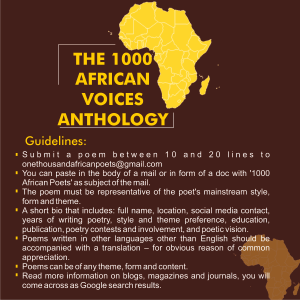There has been a growing concern among young creatives in Africa regarding lack of recognition of their poetic creativity by the older generation of..
There has been a growing concern among young creatives in Africa regarding lack of recognition of their poetic creativity by the older generation of poets and writers.
While this concern is genuine, there is also a concern among older generations regarding the quality of poetic works coming from a generation of writers whose schooling has been attributed to the proliferation of social media writing. There is a gap between the class of Soyinka, Achebe, Clark, etc. and the current generation. Interestingly too, even among contemporary writers, there are divergent opinions on what constitutes modern or contemporary African poetry. While there are no distinct ideological schools, it is pertinent to say that there are distinct styles of poetry that are attracting international recognition among African young creatives.
It is difficult to define poetry based on forms or themes. Each poetic movement has always been a response to society, literary expectations or the role of the poet in the society. For instance, Classical Poetry is not more authentic than Metaphysical, Romanticist, Postmodernist, or Feminist forms. Formalist interpretation of poetry is not more valuable than sociological analysis. The argument is that each poetic form is authentic in its form if done right. There are some who argue that poetry should be moralistic or addresses social injustice. Some prefer poetry to celebrate dark sides of human coexistence. It is, therefore, not surprising to find poets write about depression, religion, sex, gender, love, lust, and war. Poetry is a platform, a tool, and it has no morality or immorality. Poetry serves a purpose. Understanding this enriches our understanding of poetry.
The lack of recognition and the need to create a common platform for the divergent poetic expressions among young creatives are the driving force behind this project. In part too, this project gives voice to those poets whose writings have not been accorded the right attention because of what they choose to write or how they write. It is a redress to all forms of suppression and repression.
Must Read: 20+ Contest to Enter
Project: An anthology of young creatives with distinct poetic voices.
Vision: To create a platform for different poets to express poetry in their uniqueness.
Mission: To give poets the opportunity to contribute to the growth of New Forms of African Poetry and give voice to suppressed themes, forms, and artistry.
Other Related Contest:
- New Year Encounter Poetry Contest| $500 Cash Prize and Publication
- World Press Photo Story-Telling Contest| $5,000 Cash Prize
- EPOCH Magazine Contest| $50 Cash Prize and more
- Submit Your Chapbooks For PIN 2020 Chapbook Series
- 20+ Literary Contest To Enter Before The Year Ends
- Brunel International African Poetry Prize| $3,000 Cash Prize
- Sillerman First Book Prize For African Poets| $1,000 Cash Prize
- Akuko Literary Magazine Contest| $400 Cash Prize
- Writers Magazine Short Story Contest
Modality: This project is unique in itself. It is not just a compendium of poets from Africa, it is more of an ideological, poetical and artistic conversation among young creatives, and between generations of poets. As a result, specific criteria are considered.
Poetic Vision – what drives the poet’s writing?
Voice – Does the poet have a unique voice?
Style – does the poet have a unique style?
Themes – what does the poet write about?
Expression – how does the poet create poems?
Form –is there a distinct structure attributed to the poet?
Expectations: Poets who choose to participate in this project must have grown their own poetry over a period of time. Maturity and poetic acuity are essential to participation. This is not a project for those who chance on poetry and string words on social media. This is a project for poets who have been proven skilled and worthy of their muse. Participants are expected to do the following:• Submit a poem between 10 and 20 lines to onethousandafricanpoets@gmail.com
The poem must be representative of the poet’s mainstream style, form and theme.
A short bio that includes: full name, location, social media contact, years of writing poetry, style and theme preference, education, publication, poetry contests and involvement, and poetic vision.
Poems written in other languages other than English should be accompanied with a translation – for obvious reason of common appreciation.
Enjoy 15% Discount Now: Advertise your brand, services, projects, or products NOW with Pawners Paper. Check our contact page!!
Hire a copywriter, proofreader, freelance writer and a blog writer NOW at am enjoyable discount rate!!! Check our contact page to HIRE
Assumptions:
• Any theme is allowed – including gender, sexuality, spirituality, atheism, moralism, humanism, religion, depression, lust, misery, nature, politics, social injustice, traditional values, poverty, etc.
• Any ideological inclination is allowed – classical, romanticism, modernism, feminism, Marxism, postmodernism, surrealism, sex-realism, distortionism, free verse, Dadaism, experimental form, containerization, imagism, etc.
• The poet can reproduce the poem in different contexts and with different themes using chosen unique style and form
• The poet is authentic in his art
ADVERTISEMENT
To advertise your contents, or promote your social media handles to get more followers, likes and comments or have more YouTube video views. Check out this interesting Advertising Platform.
For submissions to Pawners Paper, Click Here


%20(1).jpeg)
.png)

%20(3).jpeg)

COMMENTS